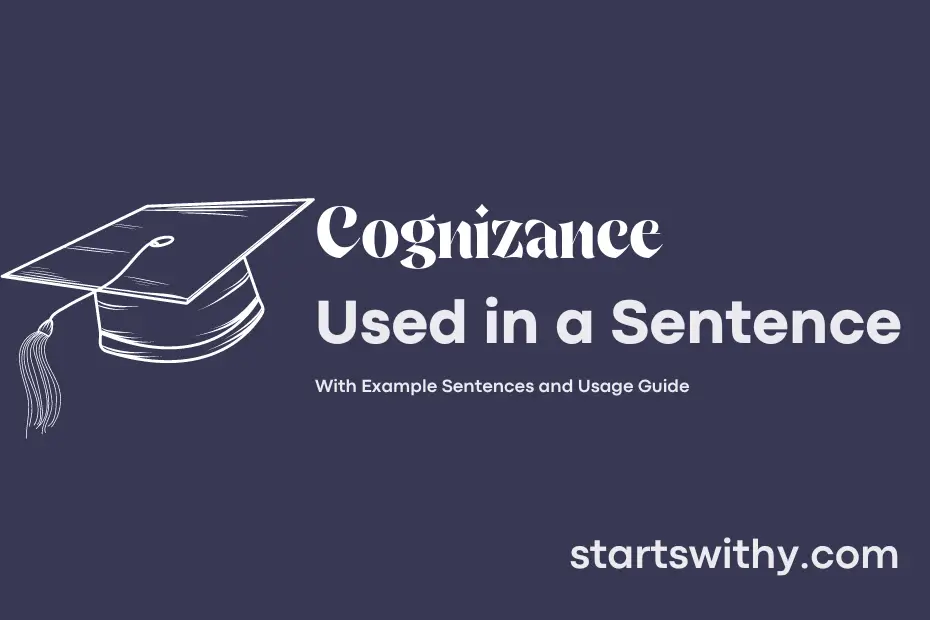Have you ever come across the term “cognizance” and wondered what it meant? Simply put, cognizance refers to the awareness or knowledge that an individual possesses about a particular subject or situation. It involves understanding or being conscious of something.
In legal contexts, cognizance also refers to the authority or power that a court has to hear and make decisions on a case. This concept is crucial in determining whether a court has the jurisdiction to handle a specific legal matter.
7 Examples Of Cognizance Used In a Sentence For Kids
- Are you aware of the animals around us? It’s important to have cognizance of them.
- Let’s pay attention and have cognizance of the colors in the rainbow.
- Do you have cognizance of the shapes we see in our daily life?
- It’s good to have cognizance of the different sounds we hear in nature.
- Can you show cognizance of the numbers from 1 to 10?
- Having cognizance of the days of the week is helpful for our schedule.
- Let’s play a game where we match objects with their names to enhance our cognizance.
14 Sentences with Cognizance Examples
- Cognizance of campus rules and regulations is important to avoid any disciplinary issues.
- It is essential to have a clear cognizance of the syllabus before starting a new semester.
- Attending workshops and seminars can help students broaden their cognizance on various subjects.
- Effective time management requires a good cognizance of one’s priorities and deadlines.
- Engaging in extracurricular activities can improve students’ cognizance of their strengths and weaknesses.
- Developing good study habits can enhance one’s cognizance and improve academic performance.
- Seeking guidance from seniors can provide valuable insights and increase students’ cognizance of college life.
- Participating in group discussions can deepen students’ cognizance of different perspectives on a topic.
- Campus events and festivals are a great way to expand your cognizance of different cultures and traditions.
- Peer mentoring programs can help freshmen gain cognizance of college resources and support systems.
- Regularly checking the college website can help students stay updated and maintain a good cognizance of important announcements.
- Being actively involved in student clubs and organizations can enhance your cognizance of leadership and teamwork.
- Practice exams are a useful tool to assess your cognizance of the course material and identify areas for improvement.
- Building a strong network with professors and industry professionals can broaden your cognizance of career opportunities and advancements.
How To Use Cognizance in Sentences?
Cognizance is used to describe someone’s awareness, knowledge, or understanding of something. When using cognizance in a sentence, it is important to ensure that it fits within the context of what you are trying to convey.
Here are some tips for beginners on how to use cognizance in a sentence:
-
Placement: Cognizance is typically used as a noun and can be placed at the beginning, middle, or end of a sentence, depending on the structure and flow of your writing.
-
Context: Make sure that the use of cognizance in your sentence accurately reflects the level of awareness or understanding you are trying to convey.
-
Punctuation: When using cognizance in a sentence, ensure that you are following proper grammar rules, including punctuation such as commas or periods.
-
Variety: To enhance your writing, consider using synonyms or related words to cognizance such as awareness, consciousness, perception, or recognition.
-
Clarity: It is essential to ensure that the sentence is clear and easy to understand for your audience. Avoid overcomplicating the sentence by using cognizance in a convoluted or ambiguous manner.
When used correctly, cognizance can add depth and sophistication to your writing by demonstrating a keen awareness or understanding of a particular subject. Experiment with incorporating cognizance into your sentences to enhance your communication skills.
Conclusion
In conclusion, sentences that contain the keyword “cognizance” demonstrate an individual’s awareness, understanding, or knowledge of a particular situation or concept. These sentences often showcase a high level of consciousness and perception, suggesting a deep understanding or recognition of the subject matter at hand. Whether used in legal contexts to refer to the acknowledgment of a fact or in philosophical discussions to denote comprehension beyond mere awareness, sentences with “cognizance” convey a sense of informed understanding.
By observing how “cognizance” is integrated into sentences across various contexts, one can appreciate the nuanced ways in which it conveys a deep level of awareness and understanding. From legal documents to philosophical treatises, sentences featuring this keyword reveal a rich tapestry of meanings and implications related to perception, comprehension, and acknowledgment.



